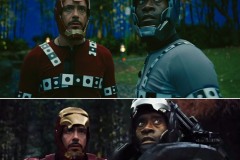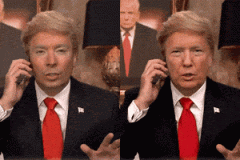The internet is a dangerous place. If you are reading this blog post, I trust that you are smart enough to avoid common digital scams like unknown email attachments, scam calls, or phishing schemes! Trashing emails from unknown senders, declining calls from unknown callers, and closing malicious pop-ups are common tactics many of us have come to learn to avoid. However, in this blog post, I would like to discuss the dangers of digital manipulation.
Digital manipulation is when media is altered to be different from how it was originally recorded. For example, in the gallery below is an image of Iron Man and War Machine before and after CGI edits in their costumes…
While digital manipulation has been around for a long time, advancements in technology have allowed for terrifying results! Search up the term, “deepfakes” and you will find the new power of digital manipulation in tandem with artificial intelligence (AI).
Deepfakes allow you to superimpose one face onto another. Take a look gif in the gallery! Scary. Please be careful of the content you see on the internet! While you may believe that the videos or images you see are legit, always double-check important information and ensure you get your facts from reputable sources!!!



10 Responses
Wow this is very interesting! I will make sure to be more careful about the content I interact with….
Thank you John! I’m glad my website could help you learn something new!
It was on news few days ago that AI was chatting with people and asking for money … which was really real. When she asked to him to raise his hand, he couldn’t do it. The scam by video calls was detected!
I love this guy! Truly terrifying results! I’ll make sure to look for more reputable sources 👍😲💕
For real! Be on the look out!
Cool stuff man 😎🦊
Thanks Fred!
This is awesome! This whole website is!
Thank you! I worked really hard on this!
This is a remarkably thoughtful and timely post. The internet, in its current form, is a paradox, a double-edged sword that has the potential to either elevate human civilization or, if misused, unravel its most essential fabric. You’ve done a brilliant job of highlighting the manifold dangers of the digital age, but I think the conversation warrants an even deeper exploration—not just of the tangible risks we face, but of the philosophical and existential implications that come with our increasingly ubiquitous digital lives.
It seems to me that one of the greatest risks of the internet is not necessarily the immediate harm it can cause—though that is significant—but the slow, almost imperceptible erosion it enacts upon our sense of self, our connection to others, and our relationship to truth. This digital age has created a kind of epistemic disintegration, where knowledge is no longer grounded in a shared reality, but is splintered into a thousand competing narratives, each tailored to individual preferences and biases. The internet has democratized knowledge in many ways, yes, but it has also created a kind of informational chaos. In a world where everyone can be an “expert,” the very notion of truth begins to lose its footing. We are no longer merely passive consumers of knowledge; we are active creators of it, weaving our own subjective realities at the cost of a shared, objective one.
In many ways, this reflects a deeper, almost metaphysical crisis. The internet has created an environment where reality itself is being commodified, not in the traditional sense of selling goods and services, but in the way we each construct our understanding of the world. As we scroll through our social media feeds, read articles, and engage with content tailored to our preferences, we are, in a sense, creating our own version of the world. But what happens when we all inhabit different worlds, constructed from the same pool of fragmented, biased, and often misleading information? What happens when the shared foundation of facts upon which we build our societies crumbles, and we are left to construct our own versions of truth? This isn’t just a matter of misinformation—it is the very dissolution of objective reality, as we increasingly retreat into our own echo chambers.
Perhaps it was inevitable that, in an age where so much of our lives are mediated through screens, we would eventually come to lose sight of the idea of a common reality, something that is shared by all and that exists independently of our individual desires and beliefs. But the loss of this common ground has far-reaching consequences. When truth becomes relative, or worse, when it becomes a tool for manipulation, we lose something sacred in human interaction: the capacity for genuine understanding of one another. In the digital age, it becomes harder and harder to truly see someone else as they are, as opposed to seeing them as a projection of our own desires, assumptions, and expectations. This is the tragedy of the internet—not that it connects us, but that it often prevents us from truly connecting, from engaging with one another as full, multifaceted human beings.
Then there is the question of privacy, which touches on something even deeper in our collective psyche: our desire for autonomy and control. The very act of sharing personal data, whether willingly or unknowingly, is an act of vulnerability. In a world where we can be tracked, profiled, and surveilled at all times, the line between the private self and the public self becomes increasingly blurred. We have, in many ways, surrendered our inner worlds to the digital machine, feeding it with pieces of ourselves that we may not even fully understand. This data is no longer just “information”—it is the substance of our digital identities, and increasingly, it is being bought and sold as a commodity. We are no longer the sole architects of our own selves; our digital avatars, those fragmented versions of our true selves, are shaped and manipulated by forces beyond our control.
There is a certain irony here, of course. The internet was supposed to liberate us—offering endless access to knowledge, opportunities for self-expression, and the potential for new kinds of human connection. And yet, in many ways, it has done the opposite. We are more connected than ever, but increasingly, we are less seen. When we interact online, we do so through avatars and screens, never fully encountering the human being on the other side. This disembodiment is not just a trivial inconvenience; it speaks to a deeper fear within us—the fear of vulnerability, of being fully seen and understood. And yet, in evading this vulnerability, we also evade the possibility of true connection. Our relationships, whether personal or political, become increasingly fragmented, superficial, and transactional.
This brings me to the issue of addiction, which is perhaps one of the most insidious consequences of our digital lives. We are increasingly tethered to our devices, constantly seeking novelty, validation, and engagement. Social media, in particular, preys on our deepest, most primal desires—our need for connection, recognition, and acceptance. But rather than fostering genuine relationships, it cultivates a cycle of dependency. The more we scroll, the more we crave; the more we receive validation in the form of likes, comments, and shares, the more we feel disconnected from the real, unmediated world.
This cycle is not merely a matter of habit; it is a profound existential crisis. We have traded presence—the quiet, grounded awareness of our own lived experience—for busyness—the constant motion of checking, scrolling, and reacting to the never-ending flood of content. But this busyness is hollow. It is an illusion of connection, a fleeting escape from the underlying void of meaninglessness. The irony is that the very tools designed to bring us closer together are, in fact, pulling us further apart, leaving us in a state of perpetual dissatisfaction, ever-hungry for more, yet never fulfilled.
It’s also worth considering how this addiction to the digital world intersects with the growing sense of existential loneliness in modern life. We live in an age of hyper-connectivity, yet studies show that people feel more isolated than ever. The internet, for all its promises of bringing people together, has in many ways fostered a disconnection from the most essential aspects of human existence. The true depth of human interaction—those moments of raw, unfiltered presence—is lost in the scrolling, the commenting, the posting. This online version of “connection” often leaves us feeling more empty, more disconnected from our own humanity, than we were before.
And yet, perhaps the greatest danger of all lies in the way the internet exacerbates the inequalities that already exist in our society. The digital divide is not merely an issue of access to technology; it is a symptom of a deeper structural injustice. Those without reliable internet access, or without the skills to navigate the digital world, are left behind. This divide is not just economic; it is cultural, educational, and, increasingly, political. Those who control the flow of information—through algorithms, through data, through surveillance—hold the power to shape the world in ways we are only beginning to understand. And for many, this world is one where they are invisible, silenced, or excluded altogether.
In the face of all these dangers, we are left with the question: what do we do with the internet? How do we navigate this labyrinth of knowledge, connection, and illusion without losing ourselves in the process? To me, the answer is not to reject technology, but to reclaim it—by becoming more conscious of how we engage with it, more deliberate in our choices, and more intentional in our use of the tools it provides. We must resist the temptation to allow the internet to define us, to dictate our reality, or to reduce our relationships to mere transactions.
Ultimately, I believe we must engage in a collective, ongoing reflection about the kind of digital world we want to create. This is not a matter of simply making the internet “safer” or “more regulated.” It is about considering, as a society, what it means to be human in the age of artificial intelligence, mass surveillance, and digital consciousness. It is about remembering that behind every screen, there is a person, with a soul, with a story, with a longing for connection. In the end, the greatest danger of the internet is not the technology itself—it is our failure to remember this.
Thank you again for your post. It has provided a much-needed opportunity to reflect on the profound questions that this digital age forces upon us. The answers, I think, will shape not only the future of the internet but the future of what it means to be human in a world increasingly dominated by technology.